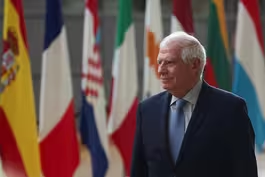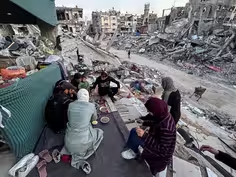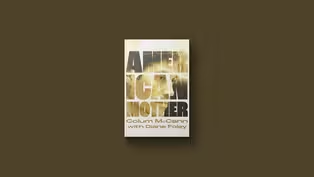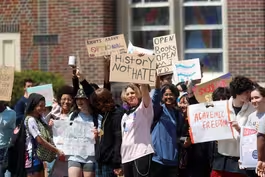
The struggles of pregnancy amid the Israel-Hamas war
Clip: 3/14/2024 | 8m 34sVideo has Closed Captions
Amid ordeal of the Israel-Hamas war, expectant mothers share the struggles of pregnancy
Of the many horrors endured by Palestinians and Israelis since the Hamas attacks of Oct. 7, perhaps none is more acute than those of expectant mothers. For the last several months, special correspondent Leila Molana-Allen has been charting the progress of their pain, their pregnancies, their sorrows and their joys. She brings us their stories now.
Problems playing video? | Closed Captioning Feedback
Problems playing video? | Closed Captioning Feedback
Major corporate funding for the PBS News Hour is provided by BDO, BNSF, Consumer Cellular, American Cruise Lines, and Raymond James. Funding for the PBS NewsHour Weekend is provided by...

The struggles of pregnancy amid the Israel-Hamas war
Clip: 3/14/2024 | 8m 34sVideo has Closed Captions
Of the many horrors endured by Palestinians and Israelis since the Hamas attacks of Oct. 7, perhaps none is more acute than those of expectant mothers. For the last several months, special correspondent Leila Molana-Allen has been charting the progress of their pain, their pregnancies, their sorrows and their joys. She brings us their stories now.
Problems playing video? | Closed Captioning Feedback
How to Watch PBS News Hour
PBS News Hour is available to stream on pbs.org and the free PBS App, available on iPhone, Apple TV, Android TV, Android smartphones, Amazon Fire TV, Amazon Fire Tablet, Roku, Samsung Smart TV, and Vizio.
Providing Support for PBS.org
Learn Moreabout PBS online sponsorshipAMNA NAWAZ: Of the many horrors endured by Palestinians and Israelis since the Hamas attacks of October 7, perhaps none is more acute than those of expectant mothers.
For the last several months, special correspondent Leila Molana-Allen has been charting the progress of their pain, their pregnancies, their sorrows and their joys.
She brings us their stories now.
LEILA MOLANA-ALLEN: Each day in Gaza, mothers search desperately for food for their children.
By night, as Israeli airstrikes pound the strip, they pray those children will live to see morning.
Expectant mothers live in fear their babies will never be born at all.
An estimated 50,000 women in Gaza are currently pregnant, with about 180 babies being born each day.
Medical staff report newborns being birthed on blood-soaked floors and in dirty bathrooms of overwhelmed hospitals, and Caesarean sections carried out without anesthetic.
Three months ago, Eman El Bashliki had an emergency C-section after she went into labor while fleeing heavy bombing in North Gaza.
EMAN EL BASHLIKI, Displaced Mother From Jabalia Refugee Camp (through translator): They bombed all the hospitals in the north in the Jabalia camp, and the bombing was happening over our heads.
LEILA MOLANA-ALLEN: Her displaced family is now living in filthy conditions, so the wounds from her Caesarean surgery have become badly infected.
With medical stocks almost wiped out, she's hoping the doctors will still have enough antibiotics left to help her.
EMAN EL BASHLIKI (through translator): I'm so exhausted.
I can't even get up to play a mother's role in my baby's life.
I can't walk or get up to feed him or hold him.
LEILA MOLANA-ALLEN: Trapped by bombing for weeks, three months pregnant, Eman Mashaeer finally made it here for a checkup.
The doctors had devastating news.
There was no heartbeat.
Worse still, they haven't been able to operate to remove the fetus because there are just too many critically injured patients they have to treat first.
If Eman has to wait much longer, sepsis could kill her.
EMAN MASHAEER, Displaced Mother From Central Gaza (through translator): I have known for a month now that my baby is dead, and they still haven't removed it because of the huge numbers of people here.
I'm scared because I have to have an operation without any anesthesia.
The doctor says I might become poisoned by the failed pregnancy.
LEILA MOLANA-ALLEN: Severe malnutrition, scarce clean water and dire living conditions are leading to a massive rise in premature and underweight births, miscarriages and death of mothers and newborns.
Most of Gaza's hospitals have collapsed, thanks to Israel's aerial bombardment and the siege, cutting off medical supplies and electricity.
Rafah's Emirati Hospital is still hanging on.
Doctors and midwives here do what they can to cope.
Dr. Sanaa El Jazar is a resident pediatrician.
DR. SANAA EL JAZAR, Resident Pediatrician, Emirati Hospital (through translator): There is a high percentage of critical cases coming in and a high percentage of death.
A lot of women are giving birth prematurely as a result of fear and the war and chaotic living circumstances.
After the women go home with their babies, they come back a few days later because their babies have dehydration or they have diarrhea or they're vomiting.
LEILA MOLANA-ALLEN: UNICEF's Tess Ingram was horrified by the condition she found mothers and babies enduring on a recent visit.
TESS INGRAM, UNICEF: It is unbelievable what is happening here at the Emirati Hospital.
The situation is very desperate.
Some of the mothers haven't made it through giving birth.
We're calling for an immediate cease-fire, so that the fighting can stop and so that UNICEF and other aid agencies can bring them the help that they need.
LEILA MOLANA-ALLEN: As Hamas rockets continue to fall across the border in Israel, expectant mothers live in the shadow of this war.
Ilana Polat is a midwife at Sderot Hospital, one of the largest in Southern Israel.
The maternity clinic here has been moved into a reinforced concrete shelter after multiple rockets hit the hospital.
ILANA POLAT, Midwife: Very scary for women, very scary for the families and for the babies, because any time we can hear a siren, and we are not in a protected area, we need to run, and women after birth with epidural cannot run.
Yes, it's here.
We can -- now maybe we will hear the siren here.
So, it's very emotional time and very stressful time.
LEILA MOLANA-ALLEN: Noa Tzarfati thought she wouldn't survive to see her second child born or be able to save her first.
On October 7, she, her husband and their toddler Michael hid for a full day and night as Hamas terrorists rampaged through their hometown of Kibbutz Kfar Aza on the Gaza border, killing everyone they could find.
NOA TZARFATI, October 7 Attack Survivor (through translator): I find it extremely hard to talk about those hours.
I sat there waiting for them to kill him.
I could barely look at my son because I understood in my head that his life was about to end.
And imagine thinking that for 25 hours.
LEILA MOLANA-ALLEN: In her second trimester, as the hours ticked by and she grew weaker, Noa felt sure she would lose the baby.
Finally, they were rescued by IDF soldiers the next morning.
High school teacher Noa used to be liberal to her core.
She taught her students to value all life on both sides of the border.
Now she doesn't know if she will ever feel safe again.
NOA TZARFATI (through translator): Everything has changed.
I don't care about anyone in Gaza anymore.
I won't forgive them.
When something like that happens, something very, very deep breaks inside you.
LEILA MOLANA-ALLEN: Noa says she will never go back to Kfar Aza.
She's now had a baby boy, Yair, and hopes they will find a new home with what's left of their community.
Back in Gaza, displaced multiple times and under daily bombardment, new mothers have nowhere safe to go, but barely functioning hospitals have no space to keep them.
If they're lucky enough to survive a safe birth in these conditions, they go home to filthy freezing cold shelters living on a single meal a day.
Baby formula has run out.
To breast-feed, mothers need to drink 16 cups of water a day.
Gazans are currently lucky to find two cups.
DR. SANAA EL JAZAR (through translator): If people don't have sympathy for newborn babies, for the elderly, for children living on the streets, then I don't know what to say after everything they have seen.
Jawaher Asaad gave birth an hour ago, but she hasn't been able to hold her baby, Yaman, yet.
He's in intensive care.
They're both facing life-threatening breathing issues because of the toxic smoke Jawaher has been breathing in from the improvised stove they use to keep warm.
JAWAHER ASAAD, Displaced Mother (through translator): This pregnancy was really hard on me.
There is no food.
I haven't eaten in a week.
LEILA MOLANA-ALLEN: Jawaher doesn't know how she will feed baby Yaman or the 12 other bereaved kids from her extended family waiting back in their tent.
JAWAHER ASAAD (through translator): Our kids don't deserve to live any of this, to be thrown into the streets without food, without shelter, even without clothes.
The rain and cold pour down on us, and we don't have anywhere to take shelter.
And now I have given birth.
God save us from what we're living.
LEILA MOLANA-ALLEN: The U.N. has called Gaza a graveyard for children.
Nearly 12,500 Gaza children have been killed since Israel's attack began.
That's more than the total number of children killed in all other global conflicts in the previous four years combined.
Mothers desperate to keep their children safe can do little but pray for an end to their nightmare.
As this brutal war lurches on, hopes of a peaceful future for Palestinian and Israeli children look starker than ever.
For the "PBS NewsHour," I'm Leila Molana-Allen on the Israel-Gaza border.
EU’s top diplomat calls 30,000 killed in Gaza ‘a massacre’
Video has Closed Captions
Clip: 3/14/2024 | 7m 40s | EU’s top foreign policy official calls 30,000 killed in Gaza ‘a massacre’ (7m 40s)
Gazans suffer starvation, displacement this Ramadan
Video has Closed Captions
Clip: 3/14/2024 | 5m 37s | Gazans struggle with starvation and displacement this Ramadan (5m 37s)
How quantum computing could help us understand the universe
Video has Closed Captions
Clip: 3/14/2024 | 7m 13s | How quantum computing could help us understand more about the universe (7m 13s)
Slain reporter Jim Foley’s mother on new book about her son
Video has Closed Captions
Clip: 3/14/2024 | 7m 28s | Mother of slain journalist James Foley discusses new book about her son (7m 28s)
What to know about Florida’s ‘Don’t Say Gay’ settlement
Video has Closed Captions
Clip: 3/14/2024 | 6m 43s | What Florida’s ‘Don’t Say Gay’ settlement changes and what restrictions remain (6m 43s)
Why Black women face discrimination in higher education
Video has Closed Captions
Clip: 3/14/2024 | 8m 14s | Why Black women face discrimination, mistreatment in higher education (8m 14s)
Providing Support for PBS.org
Learn Moreabout PBS online sponsorship
- News and Public Affairs

FRONTLINE is investigative journalism that questions, explains and changes our world.

- News and Public Affairs

Amanpour and Company features conversations with leaders and decision makers.












Support for PBS provided by:
Major corporate funding for the PBS News Hour is provided by BDO, BNSF, Consumer Cellular, American Cruise Lines, and Raymond James. Funding for the PBS NewsHour Weekend is provided by...





